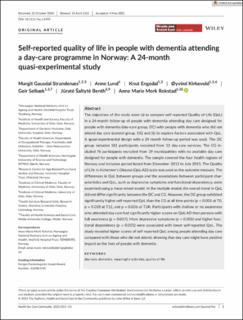Self-reported quality of life in people with dementia attending a day-care programme in Norway : A 24-month quasi-experimental study
Strandenæs, Margit Gausdal; Lund, Anne; Engedal, Knut; Kirkevold, Øyvind; Selbæk, Geir; Saltyte Benth, Jurate; Rokstad, Anne Marie Mork
Peer reviewed, Journal article
Published version
Permanent lenke
https://hdl.handle.net/11250/2784068Utgivelsesdato
2021-05-25Metadata
Vis full innførselSamlinger
Originalversjon
https://doi.org/10.1111/hsc.13455Sammendrag
The objectives of the study were (a) to compare self-reported Quality of Life (QoL) in a 24-month follow-up of people with dementia attending day care designed for people with dementia (day-care group, DC) with people with dementia who did not attend day care (control group, CG) and (b) to explore factors associated with QoL. A quasi-experimental design with a 24-month follow-up period was used. The DC group included 181 participants recruited from 53 day-care services. The CG included 76 participants recruited from 19 municipalities with no available day care designed for people with dementia. The sample covered the four health regions of Norway and inclusion period lasted from December 2013 to July 2015. The Quality of Life in Alzheimer's Disease (QoL-AD) scale was used as the outcome measure. The differences in QoL between groups and the associations between participant characteristics and QoL, such as depressive symptoms and functional dependency, were examined using a linear mixed model. In the multiple model, the overall trend in QoL did not differ significantly between the DC and CG. However, the DC group exhibited significantly higher self-reported QoL than the CG at all time points (p < 0.001 at T0, p = 0.018 at T12, and p = 0.006 at T24). Participants with shallow or no awareness who attended day care had significantly higher scores on QoL-AD than persons with full awareness (p = 0.017). More depressive symptoms (p < 0.001) and higher functional dependency (p < 0.001) were associated with lower self-reported QoL. The study revealed higher scores of self-reported QoL among people attending day care compared with those who did not attend, showing that day care might have positive impact on the lives of people with dementia.

